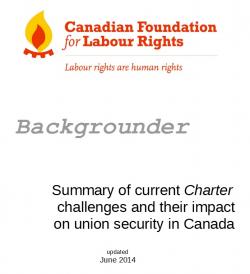This is an archive of news stories and research from the National Union of Public and General Employees. Please see our new site - https://nupge.ca - for the most current information.
“What we're hoping to accomplish with this publication is to promote greater coordination amongst unions to ensure that we present strong and coordinated arguments before the Courts.” — CFLR Board member James Clancy.
 Ottawa (25 June 2014) – The Canadian Foundation for Labour Rights (CFLR) has issued a new edition of its publication Backgrounder: Summary of current Charter challenges and their impact on union security in Canada. The publication provides a summary of cases before the courts that challenge labour laws on the basis that they violate Canada's Charter of Rights and Freedoms.
Ottawa (25 June 2014) – The Canadian Foundation for Labour Rights (CFLR) has issued a new edition of its publication Backgrounder: Summary of current Charter challenges and their impact on union security in Canada. The publication provides a summary of cases before the courts that challenge labour laws on the basis that they violate Canada's Charter of Rights and Freedoms.
Updated Backgrounder on Charter challenges reveals impact on union security
The Backgrounder provides summaries of some 27 Charter challenges and is divided into three sections:
- challenges heard by the Supreme Court of Canada and decisions are pending
- current challenges before the courts
- challenges in which a final decision has been rendered in the last two years, either by the Supreme Court of Canada, or by a lower court and the decision was not appealed.
The publication is updated twice a year. It is intended to inform the labour movement and the union-side labour law community of cases before the courts that will potentially have an impact on union security in Canada. In addition it is designed to promote the coordination of legal arguments for similar cases amongst unions and their legal counsel.
Backgrounder is a timely resource for unions and labour law community
CFLR published the first version of the Backgrounder in January 2013. CFLR recognized the need for this publication because a large number of challenges against restrictive labour laws were before Courts, and in some cases, unions were proceeding with challenges without knowing that another union had a similar challenge against the same legislation.
“What we're hoping to accomplish with this publication is to promote greater coordination amongst unions to ensure that we present strong and coordinated arguments before the courts,” noted CFLR Board member, and President of the National Union of Public and General Employees NUPGE), James Clancy.
“For instance, in our reserach in putting together the Backgrounder, we found that there were seven cases before different levels of courts in different jurisdictions against the federal government's 2009 Expenditure Restraint Act, which imposed wage caps on federal government employees and overrode previously negotiated collective agreements. Some of the unions challenging this restrictive law weren't even aware that there were other challenges against the law by other unions.”
Coordination at the Supreme Court key to success of challenges
Clancy pointed out that there is no better example of the benefit of greater coordination by unions of legal challenges than the recent Saskachewan Federation of Labour (SFL) case regarding the constitutional protection for the right to strike. The case was heard in May at the Supreme Court of Canada. For at least three months leading up to the Supreme Court hearing, efforts by the CFLR, in conjunction with the Canadian Labour Congres (CLC) Legal Challenges Coordinating Committee, helped facilitate a number of meetings between the lead counsel for the SFL and thecounsel for the 14 unions that intervened in the case. Those meetings, with the last taking place before the hearing, focused on the various legal arguments the unions were presenting and helped ensure those arguments were as strong as possible, and complemented each other.
“I'm convinced that because of our coordinating efforts, we were able to present the best case at the Supreme Court on behalf of the entire labour movement,” noted Clancy. “We took some delight in the fact that the quality and strength of our coordinating efforts were recognized by legal counsel for many of the 12 different employer-side interveners. Hopefully our efforts will pay off with the Supreme Court issuing a positive decision for the labour movement sometime in 2015.”
Download a copy of Backgrounder: Summary of current Charter challenges and their impact on union security in Canada today.
More information:
Canadian Foundation for Labour Rights
CFLR
The Canadian Foundation for Labour Rights (CFLR) is a national voice devoted to promoting labour rights as an important means to strengthening democracy, equality and economic justice here in Canada and internationally. CFLR was established and is sponsored by the National Union of Public and General Employees (NUPGE) and United Food and Commercial Workers (UFCW Canada)
NUPGE
The National Union of Public and General Employees (NUPGE) is one of Canada's largest labour organizations with over 340,000 members. Our mission is to improve the lives of working families and to build a stronger Canada by ensuring our common wealth is used for the common good. NUPGE
